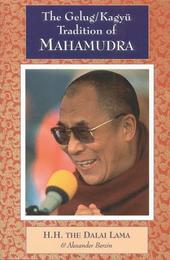
|
The Gelug/Kagyu Tradition of Mahamudra
Paperback / softback
Main Details
| Title |
The Gelug/Kagyu Tradition of Mahamudra
|
| Authors and Contributors |
By (author) Dalai Lama
|
|
By (author) Alexander Berzin
|
| Physical Properties |
| Format:Paperback / softback | | Pages:400 | | Dimensions(mm): Height 226,Width 152 |
|
| Category/Genre | Buddhism |
|---|
| ISBN/Barcode |
9781559390729
|
| Classifications | Dewey:294.3443 |
|---|
| Audience | |
|---|
|
Publishing Details |
| Publisher |
Shambhala Publications Inc
|
| Imprint |
Snow Lion Publications
|
| Publication Date |
1 January 1997 |
| Publication Country |
United States
|
Description
Mahamudra, the great sealing nature, refers to systems of meditation on both the conventional and ultimate natures of the mind. These have been transmitted through the Kagyu, Sakya, and Gelug traditions of Tibetan Buddhism. Within the Gelug, Mahamudra teachings occur in a combined Gelug/Kagyu tradition exemplified in the First Panchen Lama's Root Text for the Precious Gelug/Kagyu Tradition of Mahamudra. The work presented here contains two brilliant commentaries by the Dalai Lama. The first is a teaching based directly on the First Panchen Lama's root text. In the second, His Holiness bases his discussion on the First Panchen Lama's own commentary to this text. The book opens with an overview of Mahamudra by Alexander Berzin that discusses the relation of mind appearances and reality and offers practical techniques for overcoming problems of excessive worry, anxiety, and disturbing thoughts. This treasury of practical instruction contains extensive teachings on the nature of mind, the development of shamata, sutra and tantra levels of Mahamudra, and the compatibility of Dzogchen and Anuttarayoga Tantra.
Author Biography
Alexander Berzin received a PhD from Harvard University in 1972 from the Departments of Far Eastern Languages and Sanskrit and Indian Studies. A member of the Translation Bureau of the Library of Tibetan Works and Archives since 1972, he is the author of numerous books and articles. He frequently travels to the Americas, Central and Eastern Europe, Central Asia, Africa, and the Middle East, lecturing on Buddhism and Tibetan culture and helping to establish programs of co-operation between the Tibetan community and academic and religious institutions.
|